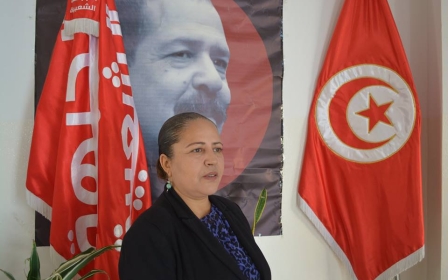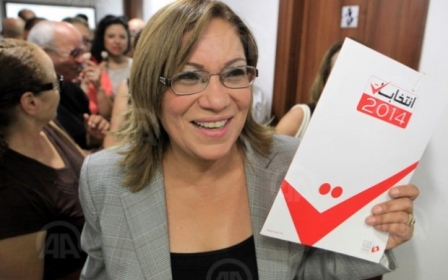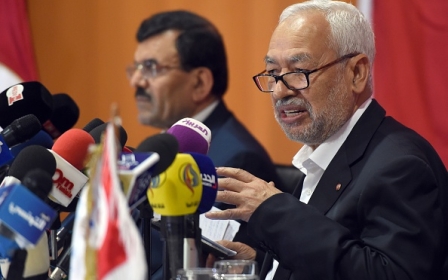Tunisia’s Nidaa Tounes: nostalgia for a past that never was?

TUNIS – Standing alone with hands splayed over an ornate white tomb, Beji Caid Essebsi, head of the party which took most seats in Tunisia’s parliamentary elections, cast an eye to the past as he launched his presidential campaign for voting, scheduled to take place at the end of November.
Moments earlier, the 87-year-old leader of Nidaa Tounes told thousands gathered on Saturday in Monastir, a town in Tunisia’s eastern coast, that it was time to “restore the prestige of the state and to unite Tunisians.”
“The state’s role must be restored and that’s our role,” he said after opening with a prayer in memory of Habib Bourguiba, Tunisia’s first post-independence president, who ruled from 1956 until he was pushed from power in 1987 by Zine El Abidine Ben Ali.
Essebsi’s party Nidaa Tounes, which formed in 2012 following Tunisia’s first elections in 2011 after Ben Ali’s overthrow, won 85 of the 217 parliamentary seats in a vote held on 26 October. Moderate Islamist party Ennahda finished in second place with 69 seats. Neither party secured enough votes to constitute a majority and govern alone.
As birthplace and burial site of former president Bourguiba, Monastir has a special place in the Tunisian popular imagination. Both Bourguiba and Ben Ali hailed from the region, known colloquially as the Sahel, which was economically favoured to the detriment of inland regions to the south that for years were politically marginalised and suffered poverty.
After years of relative absence from official public discourse during Ben Ali’s rule, Bourguiba’s image has been resurrected by Essebsi, who made a public visit to the former president’s tomb under the glare of local media.
'Selective memory'
“If there’s something that unifies the party it’s Bourguiba’s modernist social project,” said Bochra Belhadj Hamida, Nidaa Tounes MP and member of the party’s executive bureau.
Sitting in her office in front of a portrait of the former leader clutching a bouquet of white flowers, Hamida told Middle East Eye that “ideology does not unify the party.”
Light on details but heavy in conviction, the newly elected MP toed Nidaa Tounes’s party line, which aims to project an image of technocratic proficiency. “We support a state governed by law, women’s rights and freedom,” she said.
While chain smoking, Hamida recounted a story that sums up the new party’s unclear and fluid ideological vision. The MP – a lawyer, former member of Ben Ali’s RCD and ex-president of the Union of Women Democrats – described her early years as a firm opponent of Bourguiba.
Then one day at a meeting of Arab lawyers in Tunis in the 1980s, she told of her surprise when a male colleague made disparaging comments about women during a talk. “Immediately I stuck a note on my wallet,” she said. She had written “Vive Bourguiba,” deciding at that moment that the then president was a symbol of emancipation.
Bourguiba is widely credited with drafting Tunisia’s personal code, which came into force after the country gained independence from the French in 1956, stipulating equality between women and men. But as his 31-year rule proceeded, Bourguiba replaced his early radical egalitarian rhetoric with elite local coalitions as well as displaying authoritarian tendencies.
When a judge in 1986 handed down an innocent verdict to Ennahda members standing trial for charges related to their activism during a prolonged mass crackdown on Islamist movements, an infuriated Bourguiba demanded they be retried and sentenced to death.
Nidaa Tounes press secretary Aida Klibi acknowledged Bourguiba’s weaknesses. “There was no democracy,” she said. “But every generation has its obligations. For Bourguiba, these included wiping out disease, universal education and women’s rights.”
Alluding to a history of Tunisian reformers beginning in the 19th century, Klibi drew a direct line of succession to Nidaa today.
Yet Tunis-based researcher and journalist Hend Hassassi said that Nidaa Tounes is appropriating the discourse of women’s rights and modernity associated with Bourguiba to “sell themselves as a party.”
Essebsi’s feminist credentials were called into doubt recently. He caused a stir during a talk show appearance in early October when he rebuffed criticism from the vice-president of Tunisia’s constituent assembly by saying “she’s only a woman”.
According to Kmar Bendana, professor of contemporary history at the University of Manouba, Nidaa Tounes is drawing on selective memory. “In periods of difficulty you go back to the past. Bourguiba is associated with a glorious historical past,” she said. “But it’s selective. All memory is.”
Bendana added that Bourguiba’s image as independence hero was being used as a psychological strategy to capture the popular vote by playing on voters’ anxieties. The transitional period has witnessed bouts of political violence and difficult economic conditions.
“Little agreement”
Nidaa Tounes recently took its identification with Bourguiba to new heights. At a party meeting in Sousse, a coastal town south of the capital Tunis, local officials broadcast an enlarged image of the former president’s head. After several minutes of stony silence, Essebsi’s voice speaks through Bourguiba, brought back to digital life.
But critics argue that Nidaa Tounes’s evocation of Bourguiba is a smokescreen to deflect criticisms that many of its members were complicit in Ben Ali’s dictatorship, as well as the charge that it lacks internal coherence.
Opponents seize on the fact that Nidaa Tounes was born largely as a frantic response to the success of the moderate Islamist Ennahda party in the October 2011 elections.
“We view Nidaa Tounes as a reaction only,” Hayet Hamdi, central committee member of the leftist Popular Front, told Middle East Eye. “There is nothing that unites their political or economic views internally. Yet the capitalist and business tycoon elements within Nidaa Tounes have a louder voice.”
Nidaa MP Hamida dismissed this charge. “All the parties have relations with businessmen,” she said.
The party draws together a number of competing interests, from members of Ben Ali’s Constitutional Democratic Rally (RCD) and businessmen linked with the old regime to unionists and leftist independents. In October 2013, Nidaa Tounes chairman Essebsi appointed former RCD secretary general Mohamed Ghariani as his special advisor.
To counter the negative associations of such a move, Hassassi said that the party tries to “show off” its leftist currents in the media because they are “more respected.”
But behind closed doors, cracks among Nidaa Tounes’s disparate coalition have emerged. The party’s general congress, scheduled to take place in June, was cancelled. Instead of discussing contentious subjects such as a possible coalition with Ennahda, sources of party finance and the election of Nidaa’s governing bodies, party leaders chose to postpone a meeting which was expected to exacerbate tensions rather than resolve them.
In August, Essebsi’s son Hafedh withdrew his candidacy from the head of Nidaa Tounes’s electoral list in Tunis 1, one of the country’s most important constituencies, after charges of nepotism by some members of the party.
“No one agreed to this nomination,” said Faouzi Elloumi, president of the party’s electoral commission and a wealthy businessman. “It’s his father, as president of the party and the man who holds the reigns of power, who wanted his son to be at the head of the list,” he said during a talk show appearance.
While Nidaa MP Hamida said that her party’s “RCD-left cleavage is beginning to disappear,” others disagree.
Nawel Beizid, a Tunis-based political analyst and former political coordinator for the Congress for the Republic party, argued that Nidaa Tounes “could likely be three or four different political parties because there is so little agreement on political visions.”
Preserving unity among these conflicting groups “is not a tenable long-term model, and internal crises are almost certainly on the way,” Beizid added. Including politicians from left to right across the political landscape, Nidaa Tounes’s vision for Tunisia beyond limiting Ennahda’s role is vague.
“Nidaa Tounes really owes its victory to Ennahda,” Beizid added. “On top of being born as opposition [to Ennahda], it has only been successful so far because of Ennahda’s mistakes.”
“We’re not elected”
Despite the widespread criticism of Ennahda’s economic mismanagement in post-revolutionary Tunisia, a period which also saw heightened discontent with a deteriorating security situation on the nation’s borders, the Islamist party has earned a reputation for maintaining a lively internal democracy.
Nidaa Tounes representatives maintain that the party’s internal mechanisms are in the process of becoming more democratic and representative. “We’re all for being honest about this,” said Nidaa MP Hamida. “We’re not elected,” she said referring to her place on the party’s executive committee, which has around 80 members.
One rung up in Nidaa’s hierarchy sits the founders’ committee, made up of 12 members, which formulates the party’s major decisions. Attempting to justify Nidaa’s lack of internal democratic structures, Hamida points out that it is a young party that will take decisions about its future at a party congress in the future.
As they stand, Nidaa Tounes’s internal mechanisms remain opaque except in rare situations when crises have been made public. “[Nidaa Tounes] is like a black box and we cannot see inside it yet,” analyst Nawel Beizid said. In August, the party was rocked by a wave of resignations by members of its regional bureaux over disagreements about the party’s electoral lists.
“It’s hard to say, but all these examples suggest that Nidaa Tounes’s internal processes are top-down and not very democratic,” said Beizid. “There are a lot of internal changes, but they appear to only happen at the behest of Essebsi, who always remains the same – the leader.”
New MEE newsletter: Jerusalem Dispatch
Sign up to get the latest insights and analysis on Israel-Palestine, alongside Turkey Unpacked and other MEE newsletters
Middle East Eye delivers independent and unrivalled coverage and analysis of the Middle East, North Africa and beyond. To learn more about republishing this content and the associated fees, please fill out this form. More about MEE can be found here.




